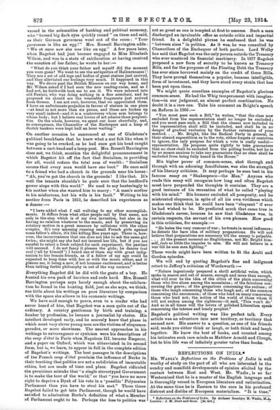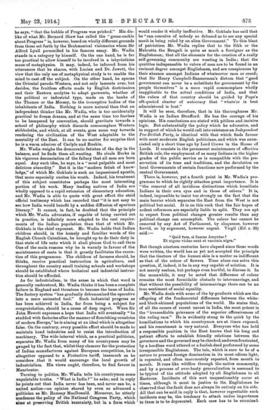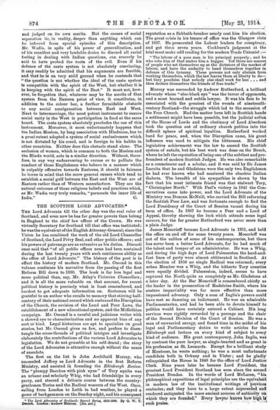REFLECTIONS ON INDIA,
Ma. WADIA.'S Reflections on the Problems of India is well worthy of study on the part of all who are interested in the sundry and manifold developments of opinion elicited by the contact between East and West. Mr. Wadia is so far Westernized that he is a master of the English language and is thoroughly versed in European literature and ratiocination. At the same time he is Eastern to the core in his profound distrust and dislike of European materialism. "It is time," • Reflections on the Problems of India. Dr Ardneer Sorabjee N. Wattle, M.A. London T. N. Dent and Sons. [8a. net.]
be says, " that the bubble of Progress was pricked." His dis- like of what Mr. Bernard Shaw has called the "goose-cackle about Progress " is, however, based on wholly different grounds from those set forth by the Brahmanical visionaries whom Sir Alfred Lyall personified in his famous essay. Mr. Wadia stands in a category by himself. On the one hand, he is far too practical to allow himself to be involved in a labyrinthine maze of metaphysics. It may, indeed, he inferred from his utterances that be shares, with Lucian and Dr. Jewett, the view that the only use of metaphysical study is to enable the mind to cast off the subject. On the other hand, he spurns the Oriental pseudo-Western, and not only laments over, but derides, the fruitless efforts made by English doctrinaires and their Eastern acolytes to adapt garments, whether of the political or industrial type, made on the banks of the Thames or the Mersey, to the irreceptive bodies of the inhabitants of India. Nothing is more natural than that an independent thinker like Mr. Wadia, who is too occidentally practical to dream dreams, and at the same time too fearless to be hampered by convention, should gravitate towards a school of philosophy which discards commonplace Western shibboleths, and which, at all events, goes some way towards rendering the civilization of the West adaptable to the mentality of the East. It can be no matter for surprise that be is a warm admirer of Carlyle and Ruskin.
Mr. Wadia weighs the democratic fetishes of the day in the balance, and he finds them alLwanting. He rivals Burke in his vigorous denunciation of the fallacy that all men are born equal. Any such idea, he says, is a "most palpable and most delirious absurdity." But it is the "modern fetish of know- ledge," of which Mr. Gokhale is such an impassioned apostle, that more especially excites his wrath. Indeed, his treatment of this subject constitutes perhaps the most interesting portion of his work. Many leading natives of India are wholly opposed to a rapid extension of elementary education, and Mr. Wadia is able to quote with great effect the staid official testimony which has recorded that "it is not easy to see how India would benefit by a sudden diffusion of spurious literacy." It cannot, in fact, be doubted that the principle which Mr. Wadia advocates, if capable of being carried out in practice, is infinitely more adapted to the real require- ments of the Indian population than that of which Mr. Gokhale is the chief exponent. Mr. Wadia holds that Indian children should, in the homely and familiar words of the English Church Catechism, be brought up to do their duty in that state of life unto which it shall please God to call them One of the main reasons why be is warmly in favour of the maintenance of caste is that it greatly facilitates the execu- tion of this programme. The children of farmers should, he thinks, receive practical instruction in agriculture, and throughout the country small training schools and workshops should be established where technical and industrial instruc- tion should be afforded.
As for, industrialism, in the sense in which that word is generally, understood, Mr. Wadia thinks it has been& complete failure in England and threatens to become the bane, of India. The factory system "has gradually dehumanized the operative into a mere animated tool." Such industrial progress as has been achieved in India, far from being a subject for congratulation, should be a cause of deep regret. When Sir John Hewett expresses a hope that India will eventually "be studded with factories after the manner of flourishing countries of modern Europe," be is aiming at an ideal which is altogether false. On the contrary, every possible effort should be made to maintain hand industries and to resist the introduction of machinery. The wide interval which, as a practical politician, separates Mr. Wadia from many of his countrymen may be gauged by the fact that, whilst they clamour for the protection of Indian manufactures against European competition, he is altogether opposed to a Protective tariff, inasmuch as he considers .,that it would encourage the local growth of industrialism. His views ought, therefore, to find favour in Manchester.
Turning to politics, Mr. Wadia tells his countrymen some unpalatable truths. "What is India ?" he asks; and in reply he points out that India never has been, and never can be, a united nation—an opinion shared by even so advanced a politician as Mr. Ramsay MacDonald. Moreover, he utterly condemns the policy of the National Congress Party,; which earns at preserving British 'suzerainty, but in a form which
would render it wholly ineffective.. Mr. Gokhale has said that he "can conceive of nobody so debased as to see any special merit in being ruled by an alien Government." To this blast of patriotism Mr. Wadia replies that to the Sikh or the Mahratta the Bengali is quite as much a foreigner as the Englishman; that all the elements for the creation of a really self-governing community are wanting in India; that the qualities indispensable to rulers of men are to be found in an eminent degree amongst Englishmen, and are conspicuous by their absence amongst Indians of whatsoever race or creed; that Sir Henry Campbell-Bannermates dictum that "good government can never be a substitute for government by the people themselves" is a mere vapid commonplace wholly inapplicable to the actual conditions of India, and that the rulers of that country should be guided by Pope's oft-quoted charter of autocracy that " whate'er is best administered is best."
It will be seen, therefore, that in his thoroughness Mr. Wadia is an Indian Strafford. He has the courage of his opinions. His conclusions are stated with pitiless and incisive logic. But substantially the policy which be advocates, and in support of which he would call into existence an Independent Pro-British Party, is identical with that which finds favour with most moderate English politicians, and which was enun- ciated only a short time ago by Lord Crewe in the House of Lords. It consists in the permanent maintenance of effective British rule, the employment of as many Indians in the higher grades of the public service as is compatible with the pre- servation of its tone and traditions, and the devolution on local Governments of certain functions now performed by the central Government.
There is, however, yet a fourth point in Mr. Wadia's pro- gramme to which he rightly attaches great importance. It is "the removal of ell invidious distinctions which humiliate Indians in their own eyes and in those of others." It is, indeed, impossible to insist too strongly on the fact that the main barrier which separates the East from the West is not political but social. It is on this rock that the fair hopes of ardent reformers are especially liable to split. They are apt to expect from political changes greater results than any political change can accomplish. The colour bar cannot be removed by any Act of Parliament, by eloquence, however fervid, or by argument, however cogent. Virgil (Eel. x. 38) said :—
"Quid him, si fescue Amyntas?
Et nigrae violas aunt et vaccine nigra."
But though nineteen centuries have elapsed since these words were written, the world has as yet not accepted the principle that the tincture of the human skin is a matter as indifferent as that of the colour of flowers. Time alone can solve this question, if, indeed, it be in any way capable of solution. It is not merely useless, but perhaps even hurtful, to discuss it. In the meanwhile, it may be noted that difference of colour remains the most formidable obstacle to intermarriage, and that without the possibility of intermarriage there can be no true sentiment of social equality.
Mr. Wadia deals with some of the by-producto which are the offspring of the fundamental difference between the white- and black-skinned populations of the world. He states that, of all the causes of recent unrest in India, the most potent is the "irremediable grievance of the superior offensiveness of the ruling race." He is evidently stung to the quick by the humiliations to which his countrymen are at times exposed, and his resentment is very natural. Everyone who has held a responsible position in the East knows that his long and patient efforts to establish friendly relations between the governors and the governed may be checked, and even frustrated, by a heedless word uttered or a foolish deed performed by some irresponsible Englishman. The tale, which is sure to be of a nature to present foreign domination in its most odious light, is repeated, and often inaccurately repeated, from mouth to mouth. It rune like wildfire through the native community, and by a process of over-hasty generalization is assumed to be typical of the attitude adopted by all Englishmen to all Easterns. Incidents of this sort unquestionably occur at times, although it must in justice to at Englishman be observed that the fault does not always lie entirely on his side. All that can be said in reply is that, however regrettable such incidents may be, the tendency to attach undue importance to them is to be deprecated. Each case has to be examined,
and judged on its OWil merits. But the causes of social Separation lie, in reality, deeper than anything which can be inferred froth special episodes of this debcription. Mr. Wadia, in spite of his power of generalization, and bf hie Manifest and Very laudable desire to discard all racial feeling lit dealing with 'Indian questionS, can scarcely be fetid to bate probed the recite of the evil. Even if his defence of the caste eyeteth is not absolutely convincing, it ntay readily be admitted that his arguments are forcible, and that he iii on very send ground when he contends that the'ipieitioil is nin whether the ideal of the caste systeni fd cortiptitible with the spirit of the West, bitt whether it is in keeping with the spirit of the East." It Mud not, how- ever, be forgotten that, whatever may be the merits of that epithet. from the Eathern point of view, it constitutes, in additioll to the Colour bar, a further formidable obstacle to any social amalgamation between Elsa and West. Next to intermarriage, the most potent instrument to ensure weld unity in the West is participation in food at the same board. The caste Systein absolutely precludes the use Of this instrument. Moreover, it most unfortenately happens that the Indian Moslem, by long association with Hinduism, has to a great extent adopted a system of social exclusiveness which is not dictated by his creed, and is foreign to his habits in Other countries. Neither does this obstacle stand alone. The seclusion of women, which is common to both the Moslem and the Hindi world, acts in a shinier direction. Withotit, there- fore, in any way endeavouring to excuse or to palliate the conduct of those Englishmen who behate in a manner which fe culpably offensive towards Eastern, it should in fairness be borne in mind that the more general causes which tend t6 establish a social gtiif between the East and the West are of Eastern rather than of Western manufacture. They are the natural outcome of those religious beliefs and practices which, as Mr. Wadia tell truly remarks, "permeate the inner life of
















































 Previous page
Previous page